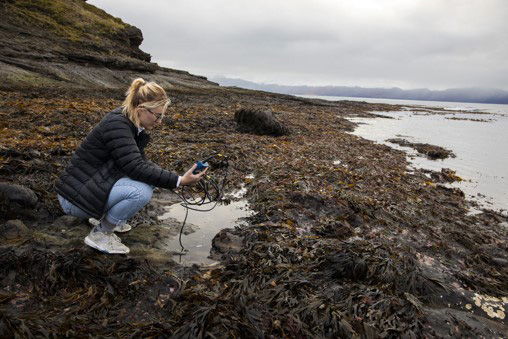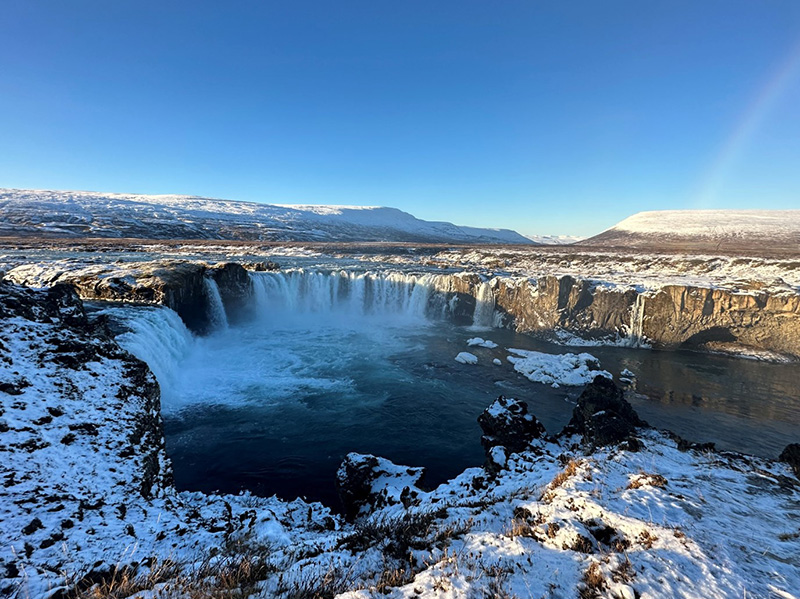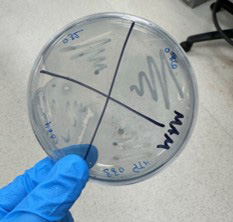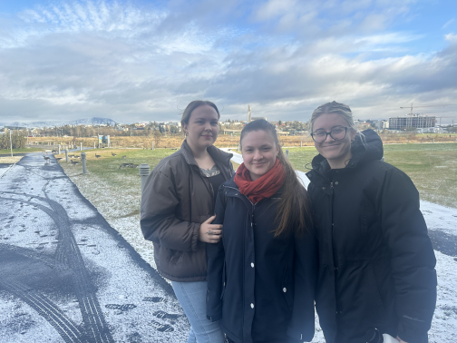We recently caught up with PhD student Emily Herbert, who has been conducting a nine-month Fulbright research project at University of Akureyri in Iceland to hear how her experience has been going.
What have you been researching?

Emily collecting samples in Husavik, Iceland.
I’m in the research group of Dr. Sean Skully. They are a microbiology lab, specifically microbial biotechnology. They are interested in anything microbes can make that can be useful.
My project is synthesizing polymers in microbes – harvesting the natural polymers that microbes make in their metabolic process. At Drexel I work in Dr. Caroline Schauer's Natural Materials and Polymer Processing Lab, so this research is related. The polymer produced by the microbe can be processed just as synthetic polymers. It has some great properties, one of which is its biodegradable, but it has its drawbacks too. One potential application would be food packaging and film. Most plastics are hard to recycle but films are particularly difficult.

The nearby Godafoss Waterfall.
How’s it going so far?
It’s been going really well. From a day-to-day perspective, it’s very similar to my life back home, but I’m in a smaller town that’s beautiful and there’s mountains. A two-hour trip will take me to landscapes I’ve never seen before. There’s a lot of natural beauty.

Emily's samples stained with a dye that binds to an intracellular biopolymer.
I’ve learned a lot of new skills in the lab. I was recently reflecting on how it doesn’t take me as long to complete tasks in the lab as it did 6 months ago. I’m also more independent in my work.
My lab mates here are very cool and really great. I’m close with my lab mates back home, we are friends and co-workers, and I can say the same thing of my lab mates here.

Emily and her labmates at a conference in Reykjavik.
The personal and professional connections I’ve made is one of the main highlights, outside of learning new skills.
Right now, I’m working on the synthesis of polymers. So that’s like step 1. In processing we have powders or pellets that we make stuff with, so I started with doing that [in Dr. Schauer’s lab] and then I went to the synthesis side, which seems a little out of order. But I do think that going into a new lab, a completely different research group, at the end of my graduate studies was a good time to do it because even if I didn’t realize it, I was getting training for this from my advisor, Dr. Schauer. So, in that sense it makes sense. And at the end of the day none of this work has to be done in a certain order, it’s a tangentially related project. It would have been great if our labs would have been able to collaborate from day one [of my graduate research] I think we could have done some cool things. I think that’s a normal thing to feel at the end of a project – to have new perspectives, all in all, is good.
Is there anything about your undergraduate/graduate experience at Drexel that you feel you benefitted from or enhanced your experience?
I have been reflecting on co-ops, because I think that’s an example of showing up somewhere as a student to do a job where sometimes you didn’t learn those things in the classroom, and now you’re in an industry setting. You have to be comfortable with just showing up and having no experience and being honest with your bosses about what you know and don’t know, but also filling in blanks where you need to and showing up as prepared as you can. I think that’s a slice of what [my experience here] is. You only get better at that by doing it, and co-op helps us with getting out there and doing it.
What advice would you give to students who are interested in major awards like the Fulbright?
I think it’s important to apply for this kind of thing. You never know. I applied to a number of awards, and this is the first major award I’ve gotten. Yes, it sucks to get rejected, but I know I’m applying to things that are competitive. Don’t let that discourage you. Get help with your writing. I think I had my story a little more together [for the Fulbright application]. You don’t have to know exactly what you’re doing to tell your story. Be patient, ask for help with the writing. The Drexel fellowships office is great.
What’s next for you?
I am hoping to have a term at Drexel to wrap things up. It’s a lot, but my committee will help let me know what can be a future work section, and I can still have ideas when I walk out the door.
I think what I’m doing here could seem noncohesive, but I think it is cohesive and it’s up to me to explain it all in a way I think makes sense. I don’t think it will be too hard to paint the picture and tell the story. I’m looking forward to it!
The 2025-26 Fulbright U.S. Student Program award competition is now open. Applications are due October 8, 2024. To learn more about fellowships resources and support available for Drexel applicants, visit https://drexel.edu/pennoni/urep/fellowships/advising-and-support/
Learn more about a PhD in Materials Science and Engineering